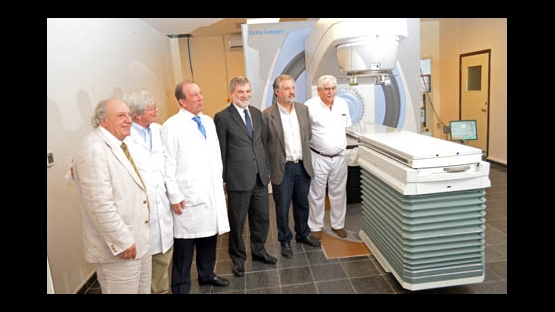A ceremony to mark the inauguration of a state of the art linear accelerator and the opening of a Secondary Standards Laboratory for the Calibration of Radiotherapy Equipment took place in the Department of Radiation Oncology of the Universidad de la Republica de Uruguay (Udelar) on 23 December 2013. The ceremony was attended by Mr Roberto Kreiman, Minister of Industry, Energy and Mining, Mr Fernando Tomasina, Dean of the Faculty of Medicine at Udelar, Mr Victor Tonto, Director of the Hospital de Clinicas, Mr Pedro Kasdorf, Director of Radiation Oncology Services, Mr Humberto Piano, national liaison officer with the IAEA, and other dignitaries.
The linear accelerator is expected to be in service within weeks, and will be used to improve cancer treatment in the hospital. The Secondary Standards Laboratory, designed to calibrate radiotherapy equipment, is the first of its type in Uruguay, and is expected to improve the treatment of patients receiving radiotherapy. The laboratory will benefit not only Uruguay but the entire Latin America region, as it will serve as a point of reference for other countries in the region developing similar laboratories, as well as as a training centre.
The establishment of the laboratory and the purchase of the accelerator are the result of cooperation between the Ministry of Industry, Energy and Mining (MIEM), the Universidad de la Republica (Udelar) and the IAEA, under the framework of technical cooperation projects titled 'Installation of a Secondary Standards Laboratory for the Calibration of Radiotherapy Equipment' (URU6028), and 'Improving the Care of Cancer Patients Through the Use of a Linear Accelerator' (URU6032), which aimed to reduce the mortality rate of cancer patients in Uruguay, and to improve care for low-income cancer patients and enhance the level of postgraduate teaching in radiotherapy.


